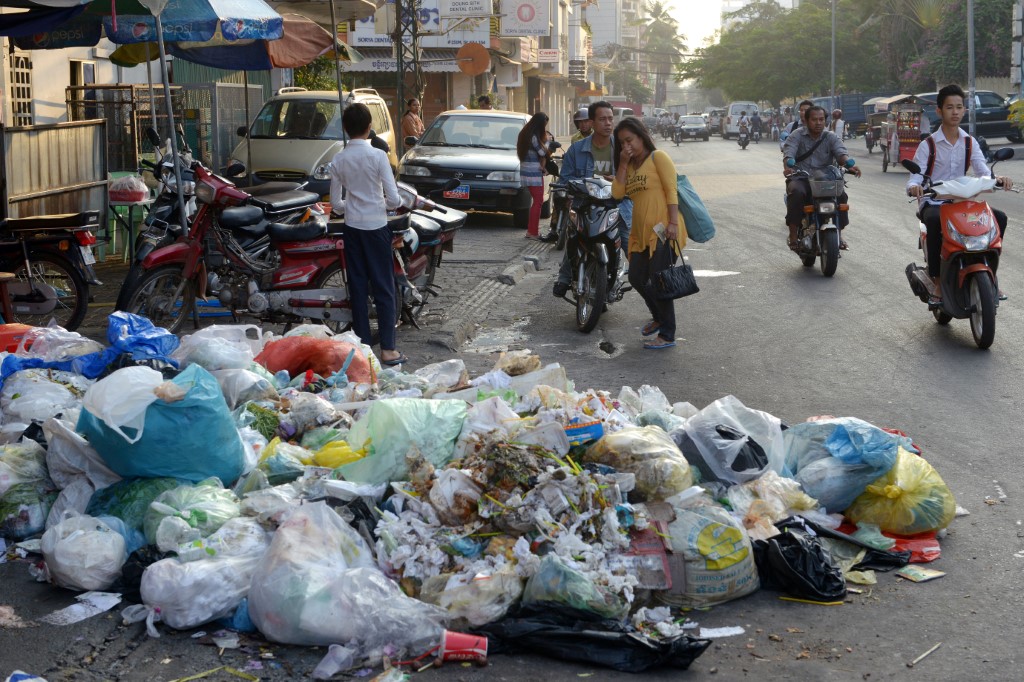Gasping for air, the residents of Phnom Penh are set to breathe a collective sigh of relief as an agreement was reached between refuse collectors and City Hall to resume work on 7 October.
With mounds of trash piling up on the Cambodian capital’s streets since the strike began on 2 October, union representatives for the workers of beleaguered waste collection company Cintri struck a deal stating they would resume work the same day.
But while this immediate dispute is over, the long-running issue of effective waste collection in the capital remains uncertain as Cintri and two as-yet unidentified companies are set to bid for control over Phnom Penh’s trash in nine days.
The Cintri workers’ union falls under the umbrella of the Cambodian Tourism Workers Federation (CTW), a broad labour advocacy group that includes 13 member organisations.
According to CTW President Touch Kosal, the deal signed Wednesday should put an end to the strike. For now, anyway.
“We want clarity, we don’t want future strikes,” Kosal told the Globe. “As long as the [Labour] Law is complied with, there won’t be any more.”
At the same time, the federation president acknowledged that the Cintri workers, perhaps motivated by anxieties ahead of the bid opener, had lept to striking before attempting any of the prior negotiation mechanisms required by that same law.
The workers had advanced five key demands to be met through striking, a list that included seniority pay and compensation for annual leave, potential severance and salary for a final month of employment. Workers also demanded “payment in lieu of prior notice”.
Two of those five demands were addressed in the agreement signed Wednesday, including the seniority pay and a promise of parting compensation for workers laid off in the event of downsizing at Cintri should their workload shrink, an uncertain prospect ahead of bid-day.
Though his federation advocates on behalf of the workers and their platform, Kosal had some reservations about the specific cause.
“I don’t really agree the [items] are totally legitimate, it’s not really the time. Cintri did not declare bankruptcy or closure,” Kosal said, adding that long-term workers had been spurred by worries of losing their benefits ahead of possible cuts.
Even if they prove to be unfounded, the concern of the sanitation workers speaks to the mounting challenge presented to their employer by fed-up city residents and officials.
Once Phnom Penh’s sole private garbage collection company, Cintri has previously commanded a monopoly on trash collection in the capital since 2002 when it was awarded an exclusive 47-year contract.
But as Phnom Penh’s population has ballooned, and its trash output with it,
Cintri has come under fire as it’s struggled to effectively manage the rubbish the capital produces. Former governor Kep Chuktema even threatened in 2008 to dump the city’s garbage in front of Cintri’s headquarters if it didn’t improve services.
They have the trucks, hundreds of them. Then, they’ve got experienced workers, so it doesn’t seem questionable … I think City Hall will tend more to Cintri because of that experience
The company, for what it’s worth, has complained that its resources are stretched, with it managing 3,000 tonnes of rubbish each day as of 2019, compared to 500 tonnes when it began operations 17 years prior. A decision last year to separate electricity and waste collection charges, previously rolled into Electricite du Cambodge bills, only reduced revenue further.
Dissatisfaction among residents and officials alike led Prime Minister Hun Sen to announce in October last year that the government had temporarily taken over Cintri’s operations, and that he would be ending the firm’s reign and putting waste disposal rights up for bidding.
“Letting Cintri continue [the service] is impossible,” Hun Sen said at the time. “We need to have at least three or four companies. We will arrange for bids, which will include Cintri.”
That bidding process, deciding the future of refuse collection in the capital, would be happening on 16 October Kosal said, with the results expected the same day. Given its experience and resources, he was confident that Cintri would retain control over the majority of refuse collection in the capital.
“First, they have the trucks, hundreds of them. Then, they’ve got experienced workers, so it doesn’t seem questionable,” Kosal said. “I think City Hall will tend more to Cintri because of that experience.”


